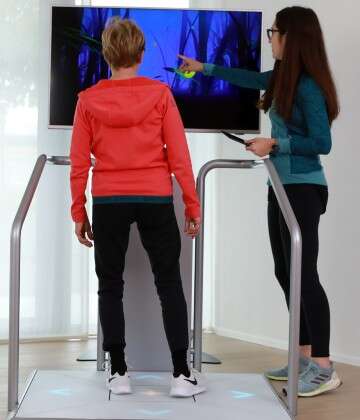CyberCycle Improves Cognitive Functioning in Seniors
 images: INTERACTIVE FITNESS, UNION COLLEGE
images: INTERACTIVE FITNESS, UNION COLLEGE CyberCycle provides greater cognitive benefits for older adults than traditional exercise. The added benefits of cybercycling include improved executive function, delay of dementia, and prevention of mild cognitive impairment.
CyberCycle, an interactive recumbent bike that uses games, group rides, virtual environments, and the element of competition to engage users in exercise, provides enhanced cognitive benefits for the elderly compared to a regular indoor bike. The CyberCycle uses a 19-inch HD monitor to immerse users in a virtual race and challenge them to steer through three dimensional scenery. Developed by Interactive Fitness, the virtual bike is particularly well suited to older adults as it keeps both their bodies and minds stimulated and in good shape.

A study conducted at Union College in Schenectady, New York, revealed that virtual-reality enhanced exercise yielded greater cognitive benefits for seniors than traditional exercise. The findings were reported in American Journal of Preventive Medicine in 2012. Study participants who used the CyberCycle two to three times a week over a period of three months also may have added protection against mild cognitive impairment (MCI).
Exercise in general may prevent or delay cognitive impairment and dementia, and improve cognitive functioning in seniors. However, interactive games like those available with the CyberCycle yield enhanced health outcomes because they shift the player's attention from the physical effort required to perform the exercises to the motivating aspects of the game, such as immersive virtual scenery and competition with other players. As a result, users exercise more frequently and more intensely on the CyberCycle which, in turn, yields better results.



The CyberCycle can improve executive function and reduce the progression to mild cognitive impairment significantly more than a regular stationary bike, even with all the other factors being equal, including frequency, intensity, and duration of exercise. Researchers believe that the interactive features of the game are responsible for this. While exercising on the CyberCycle, users are constantly required to anticipate turns, navigate a 3D landscape, and race other players. This requires enhanced decision making, divided attention, and better focus than a workout on a traditional stationary cycle. As a result, users reap added cognitive benefits for the same amount of physical effort.

The CyberCycle offers more than 40 virtual environments for users to choose from along with different games, challenges, and social features to keep them engaged. The interactive bike automatically stores records of each ride and provides detailed metrics and reporting. To learn more about the benefits of cybercycling, watch the video.

 SEND INQUIRY
SEND INQUIRY










